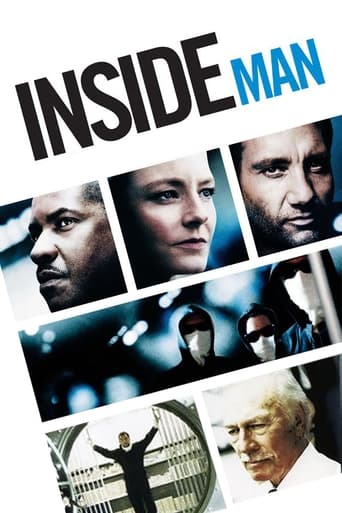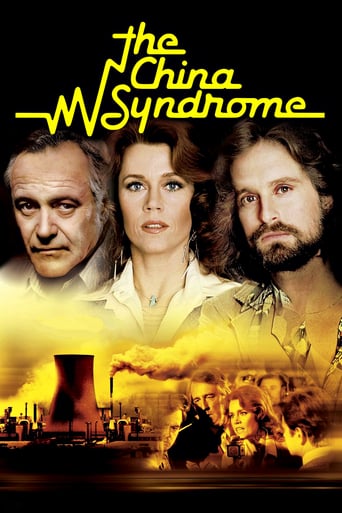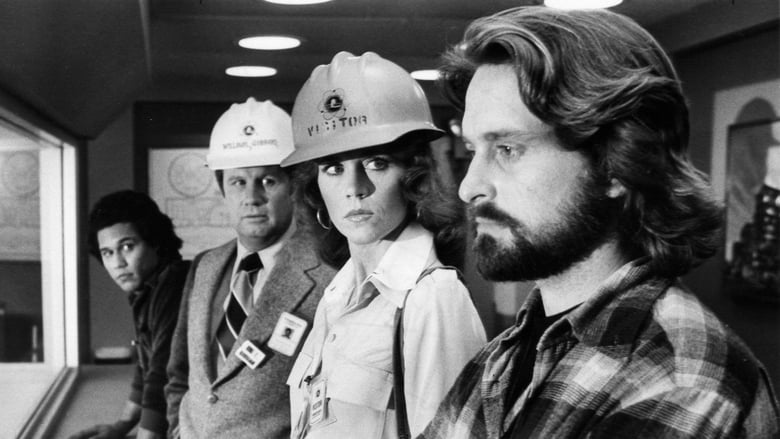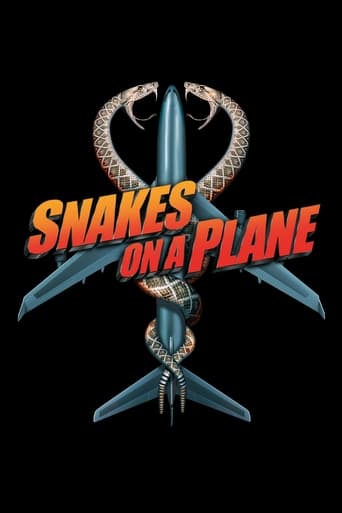The China Syndrome (1979)
While doing a series of reports on alternative energy sources, opportunistic reporter Kimberly Wells witnesses an accident at a nuclear power plant. Wells is determined to publicize the incident, but soon finds herself entangled in a sinister conspiracy to keep the full impact of the incident a secret.
Watch Trailer
Cast
Similar titles




Reviews
Please don't spend money on this.
It's entirely possible that sending the audience out feeling lousy was intentional
what a terribly boring film. I'm sorry but this is absolutely not deserving of best picture and will be forgotten quickly. Entertaining and engaging cinema? No. Nothing performances with flat faces and mistaking silence for subtlety.
Watching it is like watching the spectacle of a class clown at their best: you laugh at their jokes, instigate their defiance, and "ooooh" when they get in trouble.
The China syndrome starts with a bang- Jane Fonda and Michael Douglas are at a nuclear power plant when something goes wrong and they manage to capture it on camera. What follows is an investigation into the cover ups that ensues to make sure there is no panic. All the actors are very good here- Douglas and Fonda as the determined young reporters, Jack lemmon as the shift supervisor who unfortunately gets the blame. The pacing is great and the opening scene with the meltdown are genuinely terrifying.
This is for sure one of the most realistic movies i have ever seen ! Great stuff from the 70s , VERY GOOD acting , and simply its almost as if watching a documentary rather then a Hollywood movie.
It was strange coincidence that when "The China Syndrome" was released, a real chemical industrial disaster occurred when the Three Mile Island Incident located in Dauphin County, Pennsylvania happened 12 days after the film was released. The ticket sales skyrocketed at the box office, but the industrial community gave this film a bit of backlash for misconstruing the movie to the real events that happened which resulted in pulling the film out from several theatre outlets. Many viewers though this was another James Bridges character studies of ordinary civilians going about their day-to-day duties crossing a path between going about with their jobs and the questionable situations regarding the ethics that come with their occupations.A film like this one would be hard to craft in today's market of filming, not just about the nuclear power plant situation, but about journalism from a feminist's perspective. The film's main language does consist of overpowering technical jargon that's easy if you have an engineering degree, but incoherent if you don't. We get an in depth look at the power station along with its fuel pellets and damping rods. The nuclear station emphasis mostly on high-tech applications like SCRAM, auxiliary feed valves and the titular China Syndrome which is a thing of great concern but not the radioactive annihilation the movie makes it out to be.In spite of all the paranoia and frightful concerns, Bridges has succeeds in adding little subtleties that make this film all the more satisfying and irresistible to watch. The sound effects are clearly at the top of the line when delivering a story. When the first alarm sounds off, is the perfect call to implement panic towards the characters and the viewers. It's really quite chilling. Then you have supervisor Jack Godell (Jack Lemmon)telling everyone to shut that alarm off but is aware from the start that something is just not right. Then we come to a bit of silence which is subtle and yet very disturbing sort of like we get the blood- curdling sound likely to make you go deaf and then it just stops and replaced by the building's rumblings and workers muttering words that lack in anything but comforting.The scenes Bridges feels more at ease is when he turns his attention to the broadcast studios mainly because Bridges started his career in broadcast journalism where we see the eventual boost in the career towards ambitious reporter Kimberly Wells (Jane Fonda). Fonda is really outstanding in her Oscar nominated performance as a reporter trying to cover more serious news coverage like this one but is sadly held back due to the narcissism of the newsroom and is only looked upon as eye candy. While this is happening, Bridges grills incompetent TV producers through their half-baked news segments and their chronic sexist ways while this heavy-hitting industrial catastrophe falling into becoming more dignified.Bridges makes his film come to life by adding more inventive ways to keep the chill factor alive in his movie without spoon-feeding his audience. The courier gets killed in fatal car crash scene is a nod to the infamous Karen Silkwood story. The exciting scene where Godell outsmarts his mysterious killers is the kind of thing Bridges wants as we watch a jittery person on his way to work while at the same shows his incredible exhibition of demolition driving.The climax of "The China Syndrome" was handled for better and worse is reasserted to archaic values. For example the main one is for the broadcast worker's job to gather as much news coverage as efficient and informative as possible. However, Godell can't give that much because he's only a plant supervisor and Wells is way too inexperienced to be caught up in the middle of the ruckus. Many thrillers before and after this one shows how complicated it is more important to gather information to the general public than hostages, weaponry or relics. And then we get the same routine where the brave but foolish reporter where she maintains her composure and to confidently claim that she knows exactly what she's talking about.At first impression, we don't get very to see except steel and glass, with the exception of browsing over Los Angeles interstate highways. But then Bridges adds the intensity of blinking lights, situation boards, some public relations joker informing the plant technicians that there's a snag and the system that needs urgent attention and we get blurry video footage of monstrous steel masses on the brink of collapsing. To top it all off, the stoic robotic sounds of the teleprinter printing out in step-by-step procedures of a potentially catastrophic disaster.
"The China Syndrome" makes for a potboiler of a story, and the fact that a similar incident happened just after the film's release gives it a frightening authenticity. Granted, there probably weren't any hit men in the real-life Pennsylvania tragedy, but this is nonetheless heady stuff. The movie unfolds at a leisurely pace, but the mounting tension always keeps things moving. And it's grounded by some good performances (chiefly Jack Lemmon, although Jane Fonda has a handle on the human- interest-turned-investigative reporter). Michael Douglas is also no slouch, what with his full-on Kenny Loggins vibe.It really stung when a key character was killed, but it didn't detract from my enjoyment of the film. "The China Syndrome" is a remarkably tense movie and takes us back to a time when the news media weren't useless. Great movie. And those silent credits are unbelievably haunting!8/10











